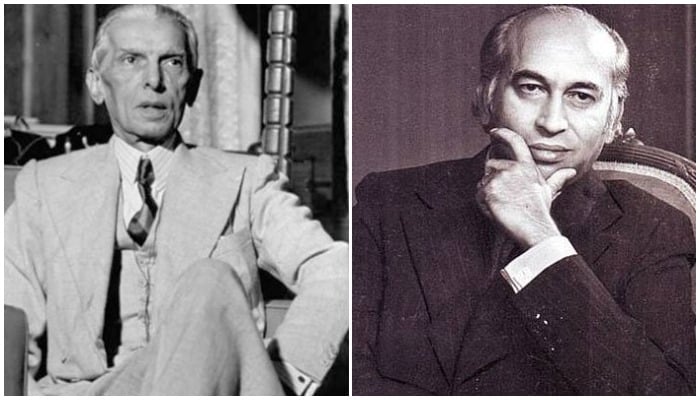M WAQAR..... "A man's ethical behavior should be based effectually on sympathy, education, and social ties; no religious basis is necessary.Man would indeed be in a poor way if he had to be restrained by fear of punishment and hope of reward after death." --Albert Einstein !!! NEWS,ARTICLES,EDITORIALS,MUSIC... Ze chi pe mayeen yum da agha pukhtunistan de.....(Liberal,Progressive,Secular World.)''Secularism is not against religion; it is the message of humanity.'' تل ده وی پثتونستآن
Tuesday, January 4, 2022
#Pakistan - The day Salman Taseer fell silent
Z A Bhutto's letter to Jinnah before Pakistan's independence
- Former President of Pakistan Zulfikar Ali Bhutto wrote a letter to Quaid-e-Azam Muhammad Ali Jinnah back in 1945.
- Bhutto wrote the letter at the age of 17 in which he talked about his interest in politics.
- Jinnah advised Bhutto to study politics and not neglect education.
Former President and Prime Minister of Pakistan Zulfikar Ali Bhutto wrote a letter to Quaid-e-Azam Muhammad Ali Jinnah back in 1945 on April 26 when Pakistan hadn’t come into existence yet.
Bhutto wrote the letter at the age of 17 in which talked about his interest in politics and admired the efforts of Quaid-e-Azam for an independent country, to which Jinnah gave him a piece of advice.
Bhutto wrote in the letter: “You have brought us under one platform. Every Muslim should have a wish for an independent Pakistan as Pakistan is our destiny and aim.”
“No one can stop us from being an independent country. We are a nation and you have united us,” Bhutto continued.
He further stated in the letter that he is unable to play a significant role towards the creation of Pakistan as he is still a student, adding that a time will come when he will sacrifice his life for Pakistan.
Jinnah replied to the letter on May 1, 1945.
The letter stated: "I am happy to read your letter and to know that you have been taking part in political events."
He continued the letter by giving him the advice to study politics and to not neglect education.
Quaid-e-Azam further said that he believes that Bhutto will be a successful person if he studies the political issues of India.
https://www.geo.tv/latest/389779-bhuttos-letter-to-jinnah-in-before-pakistans-independence
قائدعوام شہید نے ملک کو ایٹمی قوت بنایا,1973ءکا آئین دیا، ایٹمی پروگرام اور 1973ءکا آئین قوم کے پاس شہید بھٹو کی امانت ہیں۔ سابق صدر پاکستان اور صدر پاکستان پیپلزپارٹی پارلیمنٹیرینز آصف علی زرداری
سابق صدر پاکستان اور پاکستان پیپلزپارٹی پارلیمنٹیرینز کے صدر آصف علی زرداری نے پاکستان پیپلزپارٹی کے بانی چیئرمین قائد عوام ذوالفقار علی بھٹو شہید کے یوم ولادت کے موقع پر انہیں خراج عقیدت پیش کرتے ہوئے اس عہد کی تجدید کی ہے کہ شہید قائد عوام کے بلند کئے ہوئے پرچم کو سربلند رکھیں گے۔
انہوں نے کہا کہ ذوالفقار علی بھٹو شہید نے 1971ءمیں جنگ سے تباہ ہونے والے ملک کی دوبارہ تعمیر کی، شکست خوردہ قوم کو باوقار قوموں میں شامل کیا، دشمن کی قید سے 93ہزار فوجی جوانوں کو باعزت طریقے سے واپس لئے، بھارت کے قبضے میں گئی ہوئی زمین ہزاروں مربع زمین واپس لی۔
آصف علی زرداری نے کہا کہ قائدعوام شہید نے ملک کو ایٹمی قوت بنایا,1973ءکا آئین دیا، ایٹمی پروگرام اور 1973ءکا آئین قوم کے پاس شہید بھٹو کی امانت ہیں۔
انہوں نے کہا کہ شہید ذوالفقار علی بھٹو نے عوام کو سیاسی شعور دے کر بولنے کا ڈھنگ سکھایا تھا۔ وہ دنیا بھر میں چلنے والی جمہوری تحریکوں کے حامی تھے اور اسلامی دنیا کے باہمی اتحاد کے بانی تھے۔ انہوں نے کہا کہ قائد عوام شہید کے فلسفے کے مطابق پاکستان پیپلزپارٹی ملک کو مشکلات سے نکالے گی۔ پاکستان پیپلزپارٹی پارلیمنٹ کی بالادستی اور آئین کی حکمرانی کے اصولوں پر قائم ہے۔ انہوں نے کہا کہ غربت، جہالت اور عوام کا استحصال کرنے والوں کے خلاف جنگ جاری رہے گی۔
https://www.ppp.org.pk/pr/26016/



